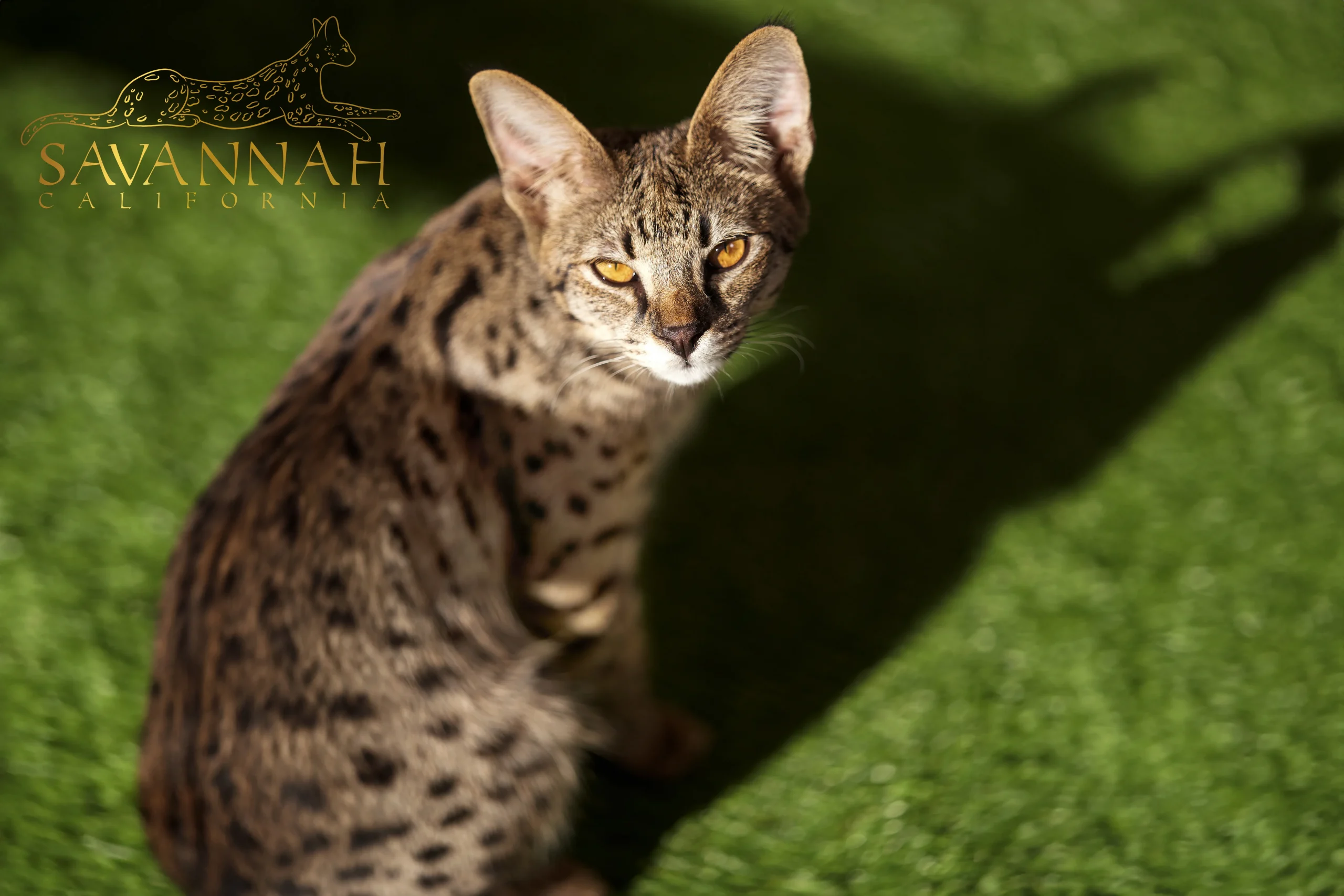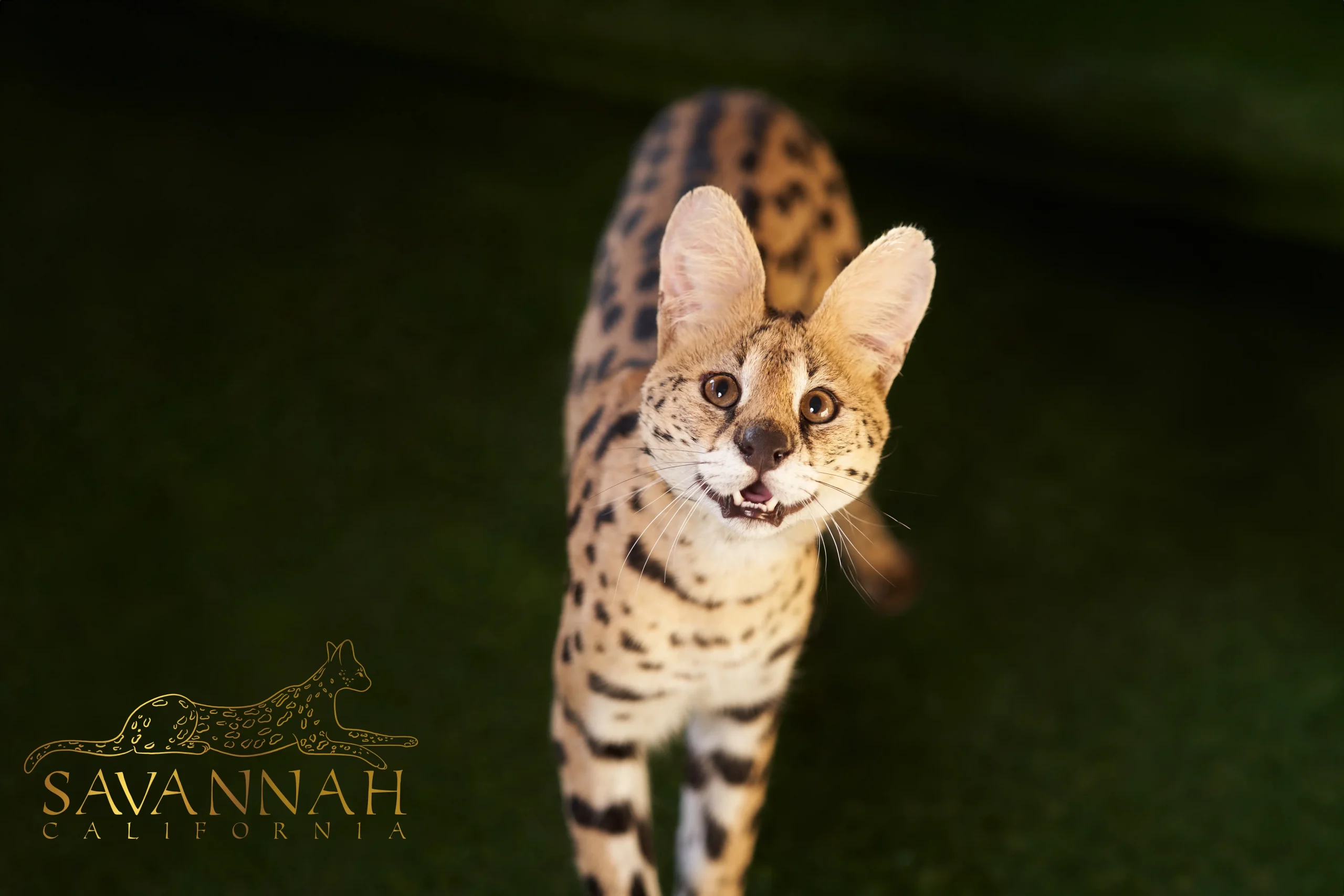What is a Savannah Cat?
The Savannah cat is one of the rarest and most unique hybrid cats in the world, created by crossing an African Serval with a domestic cat. These cats are renowned for their exotic appearance, featuring long legs, long sleek bodies, large ears, and distinctive spots.
Generations of Savannahs
Savannahs are classified into generations by their distance from the Serval ancestor:
- F1: Serval + domestic cat = Savannah F1 (50% Serval)
- HPF1: Serval + Savannah F1 = Savannah HPF1 (75% Serval)
- F2: Savannah F1 female + Savannah F5 male = Savannah F2 (approximately 25% Serval)
- F3: Savannah F2 female + Savannah F5 male = Savannah F3 (around 12.5% Serval)
- F4: Savannah F3 female + Savannah F5 male = Savannah F4 (less than 10% Serval)
- F5: Savannah F4 female + Savannah F5 male = Savannah F5 (less than 10% Serval)
Coat Colors
Savannahs come in various coat colors:
- Brown Spotted Tabby (BST): The most common, with warm golden or cool tones and black spots
- Silver Spotted Tabby (SST): Almost white or light grey with black spots
- Melanistic: Black with black spots, resembling a panther
- Classic (Marble): With a swirling pattern on the coat
Lifespan and Characteristics
Savannahs can live from 12 to 20 years with proper care. These cats require a lot of attention and physical activity. They are known for their loyalty, intelligence, and playfulness. Savannahs enjoy water and often play with it, that is unusual for cats.
Care requirements
- Kittens: 50-70 grams of food, 3-4 times a day.
- Adult cats: 150-200 grams of food, 2-3 times a day.
Toys for Savannah Cats
Savannah cats have a strong hunting instinct and play actively. They can accidentally swallow small toy parts, so choosing toys requires special attention. Toy Selection Recommendations:- Durable Dog Toys: These are made from sturdy materials that are hard to chew through.
- Avoid Soft Toys with Stuffing: Such toys tear easily, and the cat might eat the stuffing.
- Safety: Choose toys without small removable parts.
- Active Toys: Interactive toys like laser pointers and balls are great options.
- Soft Toys with Stuffing: The cat might eat the stuffing.
- Pads and Blankets: These items can also be chewed and swallowed.
How to Prepare for the Arrival of a Savannah Kitten
Acquiring a Savannah kitten requires careful preparation. First Days:- Small Space: Keep the kitten in one room for the first two days to help them get used to their new environment.
- Litter Box: Place a litter box in the room so the kitten knows where it is right away.
- Food and Water: Ensure easy access to food and water.
- Space: The room should be small and cozy.
Meeting the kitten
How to Prepare for the Arrival of a Savannah Kitten
Acquiring a Savannah kitten requires careful preparation.
First Days:
- Small Space: Keep the kitten in one room for the first two days to help them get used to their new environment.
- Litter Box: Place a litter box in the room so the kitten knows where it is right away.
- Food and Water: Ensure easy access to food and water. Consider buying a water fountain or a special water dispenser for cats to ensure they have access to fresh water at all times.
- Cozy Space: The room should be small and cozy.
Transition to General Area:After two days, let the kitten explore the general area of the house while keeping an eye on them.
Feeding Preparation:
• Stock Up on Meat and Food: Purchase meat and cat food in advance. Before serving the meat, it must be thoroughly thawed so that it is not cold. You can take it out of the freezer a few hours before feeding and soak it in warm water. Serve it thoroughly thawed.
What Comes with Your Savannah Kitten
When you purchase a Savannah kitten from “Savannah California,” you will receive the following:
- Health Certificate: A certificate from a licensed veterinarian verifying the kitten’s health status.
- Vaccination Records: Documentation of all vaccinations the kitten has received.
- TICA Registration Papers: Official registration papers from The International Cat Association (TICA).
- Starter Kit:
• Food: A sample of the kitten’s current food to help transition to your preferred brand.
• Toys: A few favorite toys to help the kitten feel comfortable in its new home.
• Litter: A small amount of the litter the kitten is used to, making it easier for them to adjust to their new environment. - Care Instructions: Detailed instructions on how to care for your Savannah kitten, including feeding, grooming, and health tips.
- Blanket: A blanket with the scent of the kitten’s mother and siblings to help ease the transition to the new home.
- Support: Ongoing support and advice from “Savannah California” for any questions or concerns you may have about your new kitten.


PRICE LIST
Kittens Born in the USA:
- Kitten F1: $17,000 – $20,000
- Kitten F1HP: $20,000 – $24,000
- Kitten F2: $9,000
- Kitten F3: $5,000
- Kitten F4: $3,500 – $4,500
- Kitten F5: $1,800 – $2,500
Kittens Born Outside the USA:
- Kitten F1: $13,000 – $16,000
- Kitten HPF1: $18,000 – $19,000
Legal regulations for ownership
States Where Savannah Cats and Their Generations Are Legal
Savannah cats, a hybrid breed between a domestic cat and an African Serval, face various legal restrictions in the U.S. Here’s a brief overview:
States Allowing All Generations (F1 to F5 and beyond):
- Alabama
- Arizona
- Arkansas
- California
- Connecticut
- Delaware (with permit)
- Florida
- Idaho
- Illinois
- Indiana (some counties may require permits)
- Kansas
- Kentucky
- Louisiana
- Maine
- Maryland (if under 30 pounds)
- Michigan
- Minnesota
- Mississippi
- Missouri
- Montana
- Nevada
- New Jersey
- New Mexico (some cities may require permits)
- North Carolina
- North Dakota
- Ohio
- Oklahoma
- Oregon (some cities/counties may have restrictions)
- Pennsylvania
- South Carolina
- South Dakota
- Tennessee
- Utah
- Virginia
- Washington (except Seattle)
- Washington D.C.
- West Virginia
- Wisconsin
- Wyoming
States Allowing Only Later Generations (F4 and beyond):
- Alaska
- Colorado (illegal in Denver)
- Iowa
- Massachusetts
- New Hampshire
- New York (F5 and later, illegal in NYC proper)
- Vermont
States with Specific Restrictions or Bans:
- Georgia (Not allowed)
- Hawaii (Not allowed)
- Nebraska (Not allowed)
- Rhode Island (Not allowed)
- Texas (Allowed in some counties with strict permits; Montgomery County allows F4+ without a permit)
Always check local regulations for additional restrictions. Some areas may have specific rules even if the state allows ownership.
Blog
Fascinating Facts About Savannah Cats
Savannah cats are a unique and captivating breed that has garnered attention and admiration from cat enthusiasts worldwide. Here are some intriguing facts about these extraordinary felines:
1. Hybrid Origins
Savannah cats are a cross between a domestic cat and an African serval, resulting in a breed that combines the wild look of a serval with the temperament of a domestic cat.
2. Impressive Size
Savannah cats are among the largest domesticated cat breeds. They can weigh between 7 to 12 kg (15 to 26 lbs) and stand up to 45 cm (18 inches) tall at the shoulder.
3. Athletic Abilities
Known for their incredible agility and strength, Savannah cats can jump up to 2.5 meters (8 feet) in the air. They love to climb and explore high places.
4. Distinctive Appearance
Savannahs have a striking appearance with their tall, lean bodies, large ears, and beautiful spotted coats that resemble their wild serval ancestors. Each cat’s coat pattern is unique.
5. Highly Intelligent
These cats are incredibly intelligent and can be trained to perform tricks, walk on a leash, and even play fetch. Their intelligence also means they require mental stimulation to stay happy.
6. Social and Affectionate
Despite their wild ancestry, Savannah cats are very social and form strong bonds with their human families. They often follow their owners around the house and enjoy being involved in daily activities.
7. Love for Water
Unlike many other cats, Savannahs are fascinated by water. They may enjoy playing in sinks, bathtubs, and even swimming pools.
8. Unique Vocalizations
Savannah cats are known for their distinctive vocalizations, which include chirps, meows, and even hisses. They use a wide range of sounds to communicate with their owners.
9. Energetic and Active
Savannahs are highly energetic and require plenty of physical exercise and playtime. They thrive in environments where they can run, jump, and explore.
Owning a Savannah cat is a unique experience that comes with its own set of rewards and challenges. Their exotic beauty, intelligence, and playful nature make them a fascinating addition to any household willing to meet their needs.
